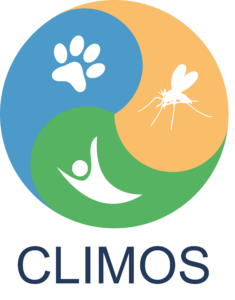Kickoff Meeting of CLIMOS Project
CLIMOS is having its Kickoff meeting in the next two days to discuss the main objectives and action points for the next 3 years
CLIMOS – Climate Monitoring and Decision Support Framework for Sand Fly-borne Diseases Detection and Mitigation with Cost-benefit and Climate-policy Measures brings together researchers, healthcare and veterinary practitioners, technology platform designers and at-risk communities, from 29 entities from 16 different countries, to conduct innovative and applied research. CLIMOS seeks to provide better understanding of climate and environmental drivers of sand fly borne diseases, to reduce model uncertainties for better prognosis of their current and potential spread, and to provide socio-economic and risk assessments for a diversity of stakeholders.
Between October 6th and October 7th, CLIMOS consortium will be together to discuss the different work packages and the action points foreseen in each one of them, as well as decide how the project will run during the next 3 years. The meeting will take place in Institute of Hygiene and Tropical Medicine (IHMT), in Lisbon – Portugal.
CLIMOS Consortium
- Universidade Nova De Lisboa (UNL);
- Istituto Superiore Di Sanita (ISS);
- Univerzita Karlova (CUNI);
- Wageningen University (WU);
- Institut Za Medicinska Istra Ivanja (IMR);
- Karlsruher Institut Fuer Technologie (KIT);
- Univerza Na Primorskem Universita Del Litorale (UP);
- Universidad De Murcia (UM);
- Helmholtz-Zentrum Fur Umweltforschung Gmbh (UFZ);
- Ege University (EGE);
- Privredno Drustvo Zentrix Lab Drustvo Sa Ogranicenomodgovornoscu Pancevo (ZENTRIX LAB LLC);
- University of Haifa (UH);
- F6s Network Ireland Limited (F6S);
- Institut National De La Sante Et De La Recherche Medicale (INSERM);
- Hacettepe Universitesi (HACETTEPE);
- Trilateral Research Limited (TRI IE);
- Universite De Reims Champagne-Ardenne (URCA);
- Erevnitiko Panepistimiako Institouto Tilepikononiakonsystimaton (TSI);
- Ministry of Health (CSO-MOH);
- Predictia Intelligent Data Solutions Sl (PREDICTIA);
- Ministero Della Salute (MoH, Italy);
- Medizinische Universitaet Wien (MEDUNI VIENNA);
- Universita Degli Studi Di Napoli Federico Ii (UNINA);
- Gligorijevic Vladan (Cubex);
- Turkiye Cumhuriyeti Saglik Bakanligi (MOH);
- Open Geospatial Consortium Europe (OGC);
- Universite D’aix Marseille (AMU);
- The University of Warwick (WARWICK);
- University of Lancaster (ULANC).
Objectives of CLIMOS
CLIMOS wants to achieve a public access interactive mapping and information services and recommendations for public and animal health, to assist future public (social, environmental, and financial) preparedness. To achieve this, CLIMOS will undertake vector surveillance and related data collection for analysis and mathematical and numerical climate, environmental and health modelling, to improve public health climate services. The project will engage with the public at risk, national stakeholders, and veterinary and public health institutions. It will seek to integrate EcoHealth and One Health approaches to produce new markers for animal and human infection risk, to detect and identify disease aetiology diversity across at-risk regions.
Five specific aims are at the core of the CLIMOS project:
To develop CLIMOS frameworks for prediction, fast screening, economic assessment, decision support, and sand fly surveillance, based on the ecosystem diversity, stakeholder needs and requirements.
- To conduct data collection from cross-laboratory field studies in 10 (ten) countries, perform qualitative data collection, data analysis, and risk assessments, as inputs to policymaking and communication activities.
- To develop decision support models for assessment of SFBD-related health and socio-economic vulnerabilities and to provide better quantification of SFBD-related losses, cumulative effects of climate measures, and climate change on SFBDs development and spread.
- To systematically validate developed models, tools, and surveillance system, in 10 (ten) countries, using a proposed general public risk assessment method for policy-relevant usage.
- To implement a comprehensive scientific and public dissemination policy and outreach programme to communicate project results to a broad audience; to standardize vector and pathogen surveillance sampling and identification; and to maximise big data ontologies.
Follow CLIMOS on Social Media – Twitter and LinkedIn to keep track of everything that is going on.
More information:
Coordinator: Carla Maia
Contact press: Diana Guardado and Inês Melo e Faro
